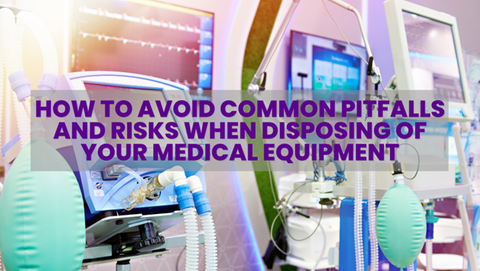How to Avoid Common Pitfalls and Risks When Disposing of Your Medical Equipment

Medical equipment is an essential part of any medical practice or hospital, as it enables the diagnosis, treatment, and prevention of various diseases and conditions. However, medical equipment also has a limited lifespan, and when it becomes obsolete, damaged, or contaminated, it needs to be disposed of properly. Improper disposal of medical equipment can pose serious risks to the environment, public health, and legal compliance. Here are some of the common pitfalls and risks when disposing of your medical equipment and how to avoid them:
- Environmental pollution: Medical equipment can contain hazardous substances such as heavy metals, radioactive materials, chemicals, and biological agents that can contaminate the air, water, and soil if not disposed of properly. These pollutants can harm the ecosystem, wildlife, and human health. To avoid environmental pollution, you should follow the local and federal regulations for the disposal of medical equipment, such as the Resource Conservation and Recovery Act (RCRA) and the Comprehensive Environmental Response, Compensation, and Liability Act (CERCLA). You should also use licensed and reputable waste management companies that can handle your medical equipment safely and responsibly.
- Exposure to infections: Medical equipment can also harbor infectious agents such as bacteria, viruses, fungi, and parasites that can cause diseases in humans and animals. These agents can spread through direct contact, inhalation, ingestion, or injection if the medical equipment is not disinfected or sterilized before disposal. To avoid exposure to infections, you should follow the infection control guidelines from the Centers for Disease Control and Prevention (CDC) and the Occupational Safety and Health Administration (OSHA) You should also wear appropriate personal protective equipment (PPE) such as gloves, masks, goggles, and gowns when handling or disposing of medical equipment.
- Legal liabilities: Medical equipment disposal is subject to various laws and regulations that aim to protect the environment, public health, and privacy. Failing to comply with these laws and regulations can result in fines, penalties, lawsuits, or criminal charges. To avoid legal liabilities, you should keep track of your medical equipment inventory, documentation, and disposal records. You should also follow the standards and best practices from the National Institute of Standards and Technology (NIST) and the Health Insurance Portability and Accountability Act (HIPAA) . You should also consult with your legal counsel or compliance officer before disposing of any medical equipment.
These are some of the common pitfalls and risks when disposing of your medical equipment. By following these tips and working with a professional medical equipment disposal service provider such as PT Medical Technologies, you can avoid these problems and ensure a safe and compliant disposal process. PT Medical Technologies is a leading provider of medical equipment disposal services that can help you with any type of medical equipment, such as X-ray machines, ultrasound machines, MRI machines, CT scanners, EKG machines, defibrillators, ventilators, infusion pumps, surgical instruments, endoscopes, catheters, needles, syringes, sharps containers, and more.
Contact us today to learn more about our medical equipment disposal services and how we can help you.